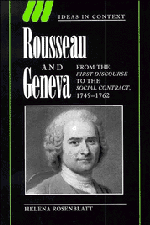Book contents
- Frontmatter
- Contents
- Acknowledgments
- Note on translation
- List of abbreviations
- Introduction. Rousseau in a Genevan context
- 1 The formation of a “citizen of Geneva”
- 2 Rousseau becomes Rousseau, 1751–1754. Geneva, doux commerce, and Rousseau from the First to the Second Discourse
- 3 Rousseau and natural law: the context
- 4 Rousseau and natural law: the Second Discourse
- 5 The “invisible chain”: Rousseau and Geneva from the Second Discourse to the Social Contract
- 6 The Social Contract
- Epilogue
- Select bibliography
- Index
- IDEAS IN CONTEXT
1 - The formation of a “citizen of Geneva”
Published online by Cambridge University Press: 28 October 2009
- Frontmatter
- Contents
- Acknowledgments
- Note on translation
- List of abbreviations
- Introduction. Rousseau in a Genevan context
- 1 The formation of a “citizen of Geneva”
- 2 Rousseau becomes Rousseau, 1751–1754. Geneva, doux commerce, and Rousseau from the First to the Second Discourse
- 3 Rousseau and natural law: the context
- 4 Rousseau and natural law: the Second Discourse
- 5 The “invisible chain”: Rousseau and Geneva from the Second Discourse to the Social Contract
- 6 The Social Contract
- Epilogue
- Select bibliography
- Index
- IDEAS IN CONTEXT
Summary
ROUSSEAU'S GENEVA
It is generally recognized that Rousseau was born and raised in Geneva. It is also well known that he was the son of a watchmaker. But what this means in terms of the kind of religious, social, and political climate Rousseau grew up in has received relatively little attention. Yet growing up in Geneva was very different from growing up in just any other French-speaking city in Europe. It meant being raised in the culture of an independent, republican, and Calvinist city-state.
Formerly an episcopal city under the dominance of the House of Savoy, Geneva had won its independence in the mid-sixteenth century through a double revolution: political emancipation had been shortly followed by the city's conversion to Protestantism. On May 25, 1536, all Genevan citizens had assembled in a General Council to accept the Reformation. Three months later Calvin arrived in Geneva to help in the reconstruction of Geneva's Church.
Calvin wanted Geneva to be the very model of a Christian commonwealth. His vision was predicated upon the fusion of belief and citizenship, illustrated by the oath he tried to impose upon the Genevan population in 1537. The people of Geneva were asked to accept the confession of faith at the same time as they swore their loyalty to the city. Over the years, Genevans would take many such oaths, essentially to confirm their covenant. According to the Serment des Bourgeois, for example, each newly admitted member of the bourgeoisie was made to promise that he would “live according to the Reformation of the Holy Gospel” even before promising to be “good and loyal to this city of Geneva.”
- Type
- Chapter
- Information
- Rousseau and GenevaFrom the First Discourse to The Social Contract, 1749–1762, pp. 10 - 45Publisher: Cambridge University PressPrint publication year: 1997



